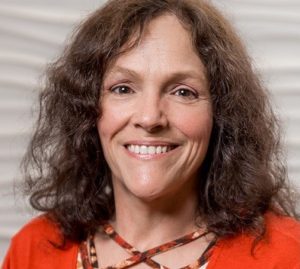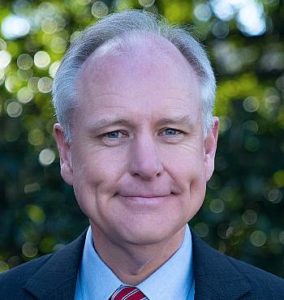Faith leaders were not surprised that the Trump administration gutted hard-fought regulations for payday lenders July 7, but they were nonetheless disappointed that years of advocacy for poor citizens appeared to be for naught.
The federal agency charged with protecting the financial interests of American consumers announced a rollback of an Obama-era regulation that required lenders to ensure their customers have the ability to repay the loans they are given.

A payday loan shop window. Photo by Gregory Maxwell, used by Creative Commons license.
“Today’s announcement, while unsurprising, is no less disheartening,” said Stephen Reeves, associate coordinator of partnerships and advocacy with the Cooperative Baptist Fellowship. “I’m afraid the agency built with consumer protection at heart has instead caved to predatory lenders.
“To do so during a pandemic when thousands, if not millions, of Americans have found themselves financially vulnerable is truly tragic. If there ever were a time to crack down on debt-trap lending, it is now.”
Baptist pastors and lay leaders have been at the forefront of a national battle to clamp down on so-called “predatory lenders.” They documented how through payday loans and auto title loans, the poorest people in American society get trapped in never-ending loan cycles with accumulated interest rates surpassing 400 percent.
Baptists and other faith leaders have called these types of high-interest loans a modern form of usury, which is forbidden in Jewish and Christian Scripture.
“At this moment of health and economic crisis, the CFPB has callously embraced an industry that charges up to 400% annual interest and deliberately makes loans that put people in a debt trap,” said Lauren Saunders, associate director of the National Consumer Law Center. “The CFPB has no basis for gutting the heart of common-sense protections that merely required payday lenders to do what responsible lenders already do: ensure that the borrower has the ability to repay. The evidence to support the debt trap of payday loans is overwhelming, and the CFPB’s flimsy excuses for repealing protections do not stand up.
“It is truly shocking that the CFPB, an agency created to protect families from financial abuses, is bending over backward to side with the most scurrilous lenders over the consumers it is supposed to protect,” she added.
The CFPB, begun in 2011 by an act of Congress, has been controversial from its birth. Created with impetus from Sen. Elizabeth Warren (D-Mass.), the oversight agency has been targeted by Wall Street and some Republicans from day one. They believe the agency exemplifies government overreach.
In 2017, critics of the agency took heart when President Trump named a staunch critic of the organization to be its interim head. Mick Mulvaney, who also was head of the Office of Management and Budget and later became Trump’s chief of staff, began dismantling the CFPB from the inside.
The July 7 announcement that CFPB would no longer enforce regulations on payday lenders — referred to by an agency news release as “small dollar lending” — was the culmination of this nine-year battle.
The agency news release asserted that citizens needing quick unsecured loans still benefit from “robust consumer protections” afforded by government policies. Also, the release said, those in need of quick cash “have increasingly innovative choices among competing small-dollar products in the marketplace.”
Lynn DeVault, chairman of the Community Financial Services Association of America, a trade group representing payday lenders, issued a statement saying the change “will ensure that essential credit continues to flow to communities and consumers across the country, which is especially important in these unprecedented times.”
“It is infuriating because it strengthens an industry that preys upon the poor and desperate in our society.”
None of this satisfies Keith Felton, senior pastor at First Baptist Church of Frankfort, Ky.
“As pastor of a church that has a ministry to get people out of the debt traps of the payday loan industry, I am deeply saddened” by this ruling, he said, calling it “both infuriating and ironic.”
“It is infuriating because it strengthens an industry that preys upon the poor and desperate in our society,” he explained. “It is ironic because instead of doing what CFPB Director Kathleen Kraninger says her department is supposed to do, namely, ‘The Bureau protects consumers from unfair, deceptive or abusive practices,’ the ruling provides an unfair and deceptive financial entity increased access to be able to exploit more individuals.”

Scarlette Jasper
Scarlette Jasper, who works with the Cooperative Baptist Fellowship among rural communities in Kentucky and Tennessee, also lamented the ruling.
“The CFPB was put in place to protect consumers, not the payday loan industry,” she noted. “As an advocate for change in this practice of usury for nearly 15 years, I will continue to advocate on behalf of the families I serve. The business model for these loans is intended to get a consumer trapped in a cycle of debt. The families that access these loans are often left with nowhere else to turn.”
Payday loans and similar products are a form of usury, she added. “When your business model targets the elderly, disabled and working poor, you should be ashamed to charge interest rates that range well up over 400%. Instead of removing the protections that were to be put in place, the CFPB should have enforced the safeguards that had been ruled upon and sought to implement more protection and educational programs for consumers.”
 Cassandra Gould has worked with a broad coalition of Christian partners from diverse theological perspectives for six years trying to make this regulation on payday lenders a reality.
Cassandra Gould has worked with a broad coalition of Christian partners from diverse theological perspectives for six years trying to make this regulation on payday lenders a reality.
“We knew this issue was not a Black or white issue but a human issue. Yet, to be poor and Black in this country makes one more vulnerable,” said Gould, executive director of Missouri Faith Voices. “Having this diluted rule that favors predation and partisanship over the wellbeing of vulnerable people released in the midst of a pandemic is immoral and predatory. To think that we spent all of these years advocating for ‘the least of these and counting on an agency whose very name indicates it would protect them, only to have that agency participate in the predation.”
Heather Mustain, associate pastor at Wilshire Baptist Church in Dallas, has been active in a statewide coalition advocating for low-income workers and families who often turn to payday loans for cash because they have few other choices. “This is incredibly disheartening,” she said of the ruling. “Advocates have worked for years to get common-sense regulations on predatory lenders and loans. These rollbacks, in the midst of a pandemic, where millions have lost employment and are financially vulnerable, is yet another atrocity committed by this administration.”
“We cannot keep silent as sisters and brothers in Christ are exploited.”
Cooperative Baptist Fellowship Executive Coordinator Paul Baxley called the “small dollar lending” business an “immoral and sinful practice of predatory lending.”

Paul Baxley
“We cannot keep silent as sisters and brothers in Christ are exploited, and we cannot ignore the systemic racial injustice inherent in this industry,” he said. “This kind of injustice is what stirred the prophet Amos to cry out against the leaders of Israel who sold ‘the righteous for silver and the needy for a pair of sandals, who trample the head of the poor into the dust of the earth and push the afflicted out of the way.’”
For his part, Reeves said Baptists and other faith leaders will not give up the fight to protect the most vulnerable in society. “This announcement is a setback, but the struggle for reform will continue. We will continue to pray and act for a return to moral lending laws that prevent the exploitation of the vulnerable and desperate.”
